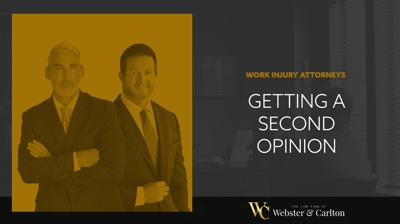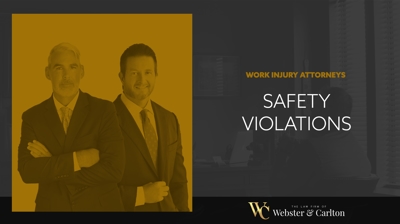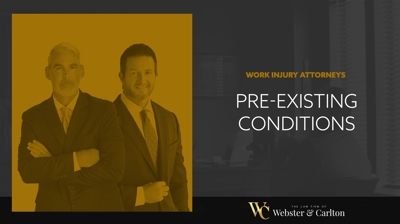
Springfield Lawyers for Workers’ Compensation Helping Clients with Pre-Existing Conditions
The premise should be simple: you sustain an injury at work, and you receive benefits from your employer's workers' compensation insurance for your medical care and wage replacement.
Unfortunately, this process is not so straightforward for some workers; they run into obstacles in securing the benefits they deserve. This is especially true for people who have pre-existing conditions, which are health conditions you had before your employment and for which you received previous treatment.
Pre-existing conditions can complicate workers' compensation claims. However, many people are able to obtain benefits with the help of an experienced Missouri pre-existing conditions attorney.
At Webster & Carlton, we handle all aspects and every nuance of the Missouri workers’ compensation system. Our firm is entirely devoted to this single area of state law, and our skilled team has proven results in assisting clients across all industries for decades.
Missouri Workers’ Compensation Law
Pre-existing conditions can significantly impact workers' compensation claims in Missouri for workers. Insurance companies may argue that the injury at issue is not work-related but rather a result of your pre-existing condition.
This can potentially lead to a denial of your claim. However, under Missouri law, if a work-related accident or activity exacerbates or accelerates a pre-existing condition, making it worse, you may still be entitled to workers' compensation benefits.
An employer is prohibited from terminating or refusing to hire individuals with pre-existing medical conditions so long as they can perform their jobs. Many companies have employees with medical conditions and disabilities, and Missouri workers' compensation laws should cover these employees just like anyone else.
The law states that people with pre-existing conditions are eligible for workers' compensation benefits so long as they meet certain requirements.
What Are Pre-Existing Conditions?
Pre-existing conditions can encompass a wide variety of health issues.
Some common examples include, but are not limited to:
- Musculoskeletal disorders: These include conditions such as arthritis, degenerative disc disease, or previous injuries to the back, neck, or joints.
- Cardiovascular conditions: Conditions such as hypertension or heart disease can be considered pre-existing if they were diagnosed prior to the work-related injury.
- Respiratory diseases: Chronic obstructive pulmonary disease (COPD), asthma, or other lung conditions are common pre-existing conditions.
- Mental health disorders: Conditions such as depression, anxiety disorders, and post-traumatic stress disorder (PTSD) can be considered pre-existing.
- Diabetes: Both Type 1 and Type 2 diabetes are typically considered pre-existing conditions.
- Neurological conditions: Conditions such as Parkinson's disease, multiple sclerosis, or previous incidents of stroke can be classified as pre-existing conditions.
Filing a Claim with a Pre-Existing Condition
Complexities can arise when a worker with a pre-existing condition suffers a job-related injury or illness. They might file a workers' compensation claim like anyone else, but the process will likely not be as easy as it would be for an employee without a pre-existing condition.
First, the insurance company will likely inquire about any medical conditions that existed before the workplace injury occurred. They might ask to see medical records to confirm the information you give them about your health and physical state.
You should always be honest about any pre-existing conditions; trying to hide them will only cause more problems in the long run. Next, you must show that the work accident or activity was the prevailing factor that led to the medical treatment you would like covered.
The work activity may not be merely a precipitating factor - it must be the prevailing factor. The insurance company will likely challenge whether your work accident was the direct cause of your injury or whether it simply exacerbated an existing injury.
Contact Webster & Carlton online or at (417) 545-3775 for a free case evaluation today.

Stay In The Know
-
Why Do I Need a Missouri Workers’ Compensation Attorney?A workers’ compensation claim can take several months, even years, to resolve, especially if you continue to suffer from the effects of your work-related injury. Your employer and its insurance company will be represented by highly skilled attorneys who know how to exploit an injured employee. You need to level the playing field by hiring a Missouri workers’ compensation lawyer who will fight on your behalf.
-
What Happens If My Employer Denies Me Workers’ Compensation Benefits?In many cases, your employer or their insurance company will promptly pay any workers’ compensation benefits. But if they deny benefits–or stop paying them before you receive what you believe you are entitled to under the law–then you have the right to file a claim with the Missouri Division of Workers’ Compensation. An administrative law judge appointed by the Division will review your claim and either conduct mediation between you and your employer, or alternatively hold a formal hearing to determine your right to compensation.
-
What Kinds of Injuries Are Covered?
Under Missouri law, workers’ compensation only covers injuries that arise “out of and in the course of employment.” This includes accidents that occur during your work shift. It also includes “occupational diseases” contracted at work, provided workplace exposure was the “prevailing” cause.
Workers’ compensation is not necessarily limited to injuries suffered at your normal workplace. If your job requires you to travel–i.e., make deliveries or conduct on-site work with clients–you may be compensated for injuries sustained in the course of such travel. However, Missouri workers’ compensation law specifically excludes injuries sustained while commuting from home to work and back, even if you use a company-owned car.
-
 What Are the Most Common Workplace Injuries That Qualify for Workers' Compensation?Workers' Comp, WorkplaceRead Article
What Are the Most Common Workplace Injuries That Qualify for Workers' Compensation?Workers' Comp, WorkplaceRead Article -
 The Long-Term Impact of Workplace Accidents on EmployeesWorkers' Comp, WorkplaceRead Article
The Long-Term Impact of Workplace Accidents on EmployeesWorkers' Comp, WorkplaceRead Article -
 Getting a Second Opinion for Missouri Work Comp ClaimsWorkers' CompRead Article
Getting a Second Opinion for Missouri Work Comp ClaimsWorkers' CompRead Article -
 Safety Violations with Missouri Work Comp ClaimsWorkers' CompRead Article
Safety Violations with Missouri Work Comp ClaimsWorkers' CompRead Article -
 Pre-existing Condition May be Covered by Workers’ CompensationWorkers' CompRead Article
Pre-existing Condition May be Covered by Workers’ CompensationWorkers' CompRead Article -
 Pre-Existing Conditions and Missouri Work CompPre-Existing ConditionsRead Article
Pre-Existing Conditions and Missouri Work CompPre-Existing ConditionsRead Article





